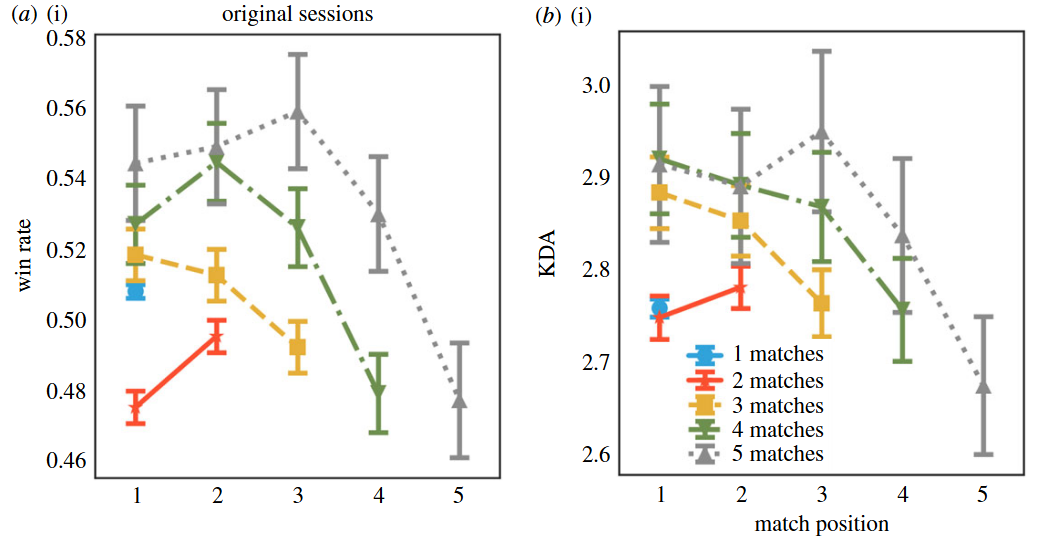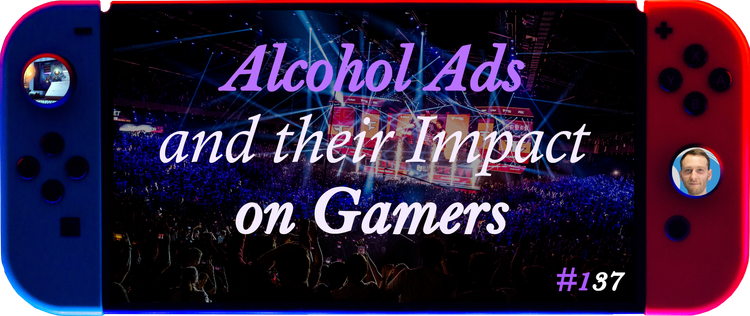Just One More Game! How Session Fatigue Hurts Your Performance

Every gamer knows that you won't play as well in your first game of the day compared to the last one, as performance likely deteriorates. As this deterioration takes place over a session, does the player's experience mitigate the effect? And what are the factors that make our mind go: "Just one more game."? Let's find out.
• Performance (win rate) does not improve with experience; you may rank up, but you get matched with similar people, leaving your overall chance of winning at ~50%.
• Team and individual performance decline over the course of a session (multiple games per day without an extended break) by 8% and 10%, respectively.
• Performance decline is more pronounced for novice players. Why that is is still unknown.
• Players stop their session depending on the length of matches and session, as well as the win/loss ratio of the session and the outcome of the last match.
• To improve your gaming performance: take breaks, don't play late and too many games.
❓ Questions and Data
Nowadays, we are often faced with complex challenges and problems that need to be solved by collaborating with others for a short amount of time—this happens millions of times per day in video games—that's you hitting the "Play" button and getting put in a team of strangers to play against other another team of strangers. But how does your and your team's performance change over the course of a session (multiple matches per day)? If it declines, does it decline for all players equally (higher and lower ranked players)? When does a player decide to call it a day on the Rift and go to bed?
In this light, the researchers analyzed data from 242,000 solo-queue matched played by 16,665 players in League of Legends. Then, they segmented matches by sessions, meaning periods where the players keep on playing without taking a longer break. Over the course of these sessions, the performance was tracked. Team performance was measured using win/loss ratio. Individual performance consisted of the number of kills, assists, and deaths (KDA) ratio.
📉 How Performance Changes Game to Game
First, the researchers find that long-term performance does not improve with experience. This means, the more you play (experience you gain), your team performance (win/loss ratio) does not get better. However, it is exactly meant to be that way. As you get better, you rank up. This causes you to get matched with people of a similar ranking. As the authors noted: "Thus, the likelihood to win each match is not significantly better than 50%." [1] This keeps each match somewhat fair and, I guess, fun(?) for everyone. The figure below shows how win rate and KDA changes with experience (number of matches played).

"Interestingly, both measures show that performance generally declines over the course of a single game playing session." [1]
This indicated that short-term performance (KDA) gets worse the more matches you play in a day without taking an extended break. Both types of performance (individual and team) are lower compared to the beginning of the same session. The researchers even put a number on it: if three or more games were played, win rate decreased by 10% and KDA by 8%—between the first and the last match of the session. However, they also noted that there is "warm-up period, where performance increases at the start of the session. You can see how performance changes, depending on the number of matches played per session.

"Moreover, we find that deterioration is more pronounced for novices, rather than veteran players, potentially reflecting the benefits of experience and learning within the game." [1]
The authors argue that experience mitigates the mechanisms responsible for causing performance to deteriorate in the short-term (a session). Moreover, they acknowledge that the reason behind why more experienced players are somewhat "shielded" against the negative effects is still unknown.
"We find that the most predictive features correspond to how many matches the player played in the current session and the win rate of the player both in the last match and throughout the session." [1]
In other words, what makes the average player decide when to call it a day on the Rift is:
- How long their session was (matches played & match length)
- How well their session went (session win/loss ratio & whether the last match was a win)
🎯 How to Manage Sessions for Better Performance
Let's start with the obvious: the longer your day (in-game or in life), the worse your performance is likely to be. Your body gets tired, your reaction time slows down, and your decision-making gets worse.
However—this applies to your allies and your enemies. So your overall win rate will still hover around 50%. But games may get more exciting (epic stomps, wild swings) or more frustrating (getting rolled over). In both cases, your body gets flooded with adrenaline and other stress hormones—making it harder to get a good night’s sleep. Is it worth it? That's for you to decide.
Second, take longer breaks. Just won a game? Great—do something else and come back later. This will also prevent you from playing (too) many matches per day.
"... we systematically observe that the team to which a player is assigned wins on average fewer matches if that player had already played other matches without taking a break." [1]
Lastly, we all know the urge to never call it a day after a loss—the just-one-more-game effect (I just coined it—you're witnessing history. 😄) However, that's exactly what you should do. Blame your team mates for the loss and go to bed.
I hope you enjoyed this episode. Another one next week. Best,
Christian 🙂







